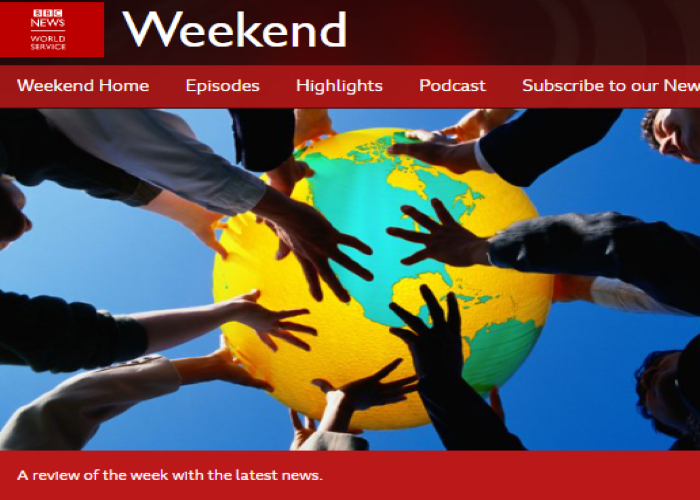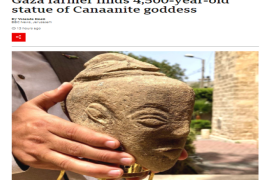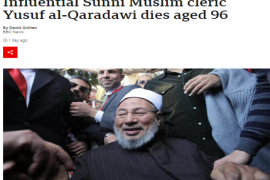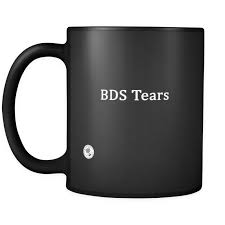Previously we looked at Yolande Knell’s exploitation of Christmas season reporting for the promotion of one-sided narratives:
BBC NEWS USES CHRISTMAS TOURISM REPORT TO PROMOTE CHOSEN NARRATIVES
On the day that written report was published, Yolande Knell also appeared on BBC World Service radio with a similarly seasonally opportunistic audio item.
The final item in the last hour of the December 24th edition of ‘Weekend’ was introduced (from 15:38 here) by presenter Krupa Padhy with a description of a town that has been under exclusive Palestinian Authority control for twenty-seven years as “occupied”: [emphasis in italics in the original, emphasis in bold added]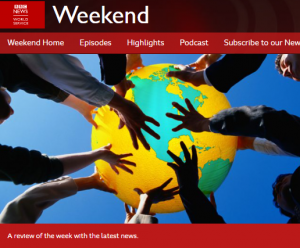
Padhy: “Well I don’t need to remind you; it is Christmas Eve and let’s now head to Bethlehem in the occupied West Bank. That is of course where Christians believe Jesus was born in a stable. The BBC’s Yolande Knell joins us on the line from Bethlehem.”
Having described the scene in Manger Square and the preparations for the evening’s celebrations, Knell went on to note the return of tourism after the Covid pandemic and the rising trade done by local businesses. Padhy however soon changed the subject.
Padhy: “It must be so reassuring for them but of course this is a part of the world that lives in the shadow of so much political and humanitarian tension. Can you just remind us of the tensions that we’ve seen in recent months there; in the occupied West Bank.”
Knell: “That’s right. I mean this is a year in which there’s been a flare-up in the Israel-Palestinian conflict that has especially affected the West Bank. We’ve seen increased deadly violence…ahm…something like 30 Israelis killed…ahm…some 150 Palestinians have been killed in the West Bank and East Jerusalem. According to official figures 2022 has been the deadliest year since 2006.”
In line with BBC practice throughout the past year, listeners were given no background information concerning the factors which have brought about that “flare-up” such as the Palestinian Authority’s loss of control over parts of the territory under its control, the participation of members of the PA security forces in terrorism and violence or foreign funding and weapons supplies for terrorist organisations. Neither did Knell bother to clarify that the majority of the Palestinians killed throughout the year were terrorists and/or people engaged in violent rioting against Israeli forces whereas the majority of the Israelis killed over the same period of time were civilians.
Having thus airbrushed the crucial context of Palestinian terrorism from the story, Knell went on to insert talking points which have no connection to the “increased deadly violence” that actually began in May 2021.
Knell: “And there are big questions over what happens next as Israel prepares to swear in its most Right-wing ever government in the next week or so. Ministers known for their anti-Palestinian rhetoric and provocative actions who are opposed to Palestinian statehood. And there have been expressions of international concern about that and of course Palestinian leaders […] have really expressed their worries about that too.”
Knell of course had nothing to tell BBC audiences around the world about the “rhetoric and provocative actions” of those worried “Palestinian leaders” or about their own positions regarding Jewish statehood. Instead, she concluded her report with a description of the Christmas celebrations in Bethlehem.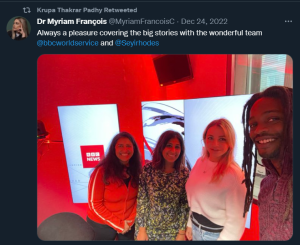
The final minutes of that item – and the programme – were given over (from 19:40) to commentary from two studio guests, the first of whom – Myriam François – had earlier been described as “a Franco-British journalist and film-maker based here in London”.
Padhy: “Myriam, I know you lived in the region back in 2003 and the challenges there are very close to your heart. Your thoughts as we begin this Christmas weekend?”
François: “I’m just, you know…Bethlehem, long before it was crippled by Covid and access for tourists from Covid, was already massively crippled by the Israeli occupation. You know, the likelihood of you being able to access Bethlehem on any given day when you live in the region – and I’m talking about the occupied territories – is completely aleatory. You don’t know…you don’t know if you can get there, or anywhere else for that matter. And of course as you heard in the report, it is a town that was once extremely vibrant and does depend on tourism. And I think tourism from also within the country and the neighbouring areas…I think a lot of people might not realise that there’s a significant Palestinian Christian community. These are not just people coming…Christians from the outside. These are, you know, local Christians; Palestinian communities for whom this is a really important event and they’re trying to come from other parts of the Palestinian territories. And the irony here is that a lot of people will be able maybe to come from the outside but many Palestinians themselves will not be able to get to Bethlehem because of the way that the occupation is organised.”
Once again listeners were not informed that Bethlehem has been under Palestinian Authority control since December 1995 and no effort was made to clarify that the crucial context to François’ exaggerated portrayals of access to Bethlehem is Palestinian terrorism. In fact, nearly 600 of the one thousand Christians living in the Gaza Strip (not all of whom celebrate Christmas in December) were granted travel permits for the Christmas season.
François went on to repeat irrelevant talking points concerning the incoming Israeli government as previously promoted by Knell:
François: “And so, you know, this is all happening on the backdrop, as we have heard in the report, you know, that the most Right-wing government we’ve seen so far in Israel coming to power. We’re hearing that this is, you know…human rights groups are saying, you know, we’re concerned for liberal Israelis, are concerned for Palestinians, we’re concerned for LGBTQ+ communities and what this is going to mean for them. So I think, you know, this is a really lovely story of how a very resilient town in the region is pushing through but I think it’s also a town with a wider context that needs support for not just Christmas but I think beyond that. Resistance to, you know, some of the darker forces that we’re seeing emerge all across the world, you know, this rise…this sort of far-Right groups which is a problem we’re seeing in Europe, we’re seeing it in America but Israel is also privy to that.”
From 21:45 listeners heard commentary from the second studio guest – Seyi Rhodes – who had earlier been introduced as “a television reporter and investigative journalist” and who appears not to be a close follower of BBC Middle East reporting.
Rhodes: “That’s one of the things I think that’s most positive about all of this is that…I mean you refer to the shadows of Covid and the restrictions and so on; people not being able to move around and us in the rest of the world not being able to hear much about what was going on and as we all know, nothing good comes from shadows and darkness. So just seeing that more people are coming back, that there’s more attention on the area and whether that’s because you’re a Christian or you’re orthodox or even for the Jewish community to recognise and remember that this is a shared…and there’s a shared history here. We have a responsibility to everybody of all faiths to, you know, access their…sites that are relevant to them, can only be a positive thing in the end. Because, you know, acknowledging that we all share this earth is surely the only way that we’re going to get towards any kind of solution.”
That opaque reference to “the Jewish community” – apparently the only community that needs to “recognise and remember” – went unexplained and unsurprisingly Rhodes appeared to have no comment to make on the topic of violent Palestinian opposition to Jews accessing “sites that are relevant to them” such as Joseph’s Tomb or Temple Mount.
To summarise, listeners to this Christmas season item heard almost seven minutes of commentary from a BBC reporter and two underinformed studio guests, all of whom airbrushed important context and facts but promoted opportunistic narratives and trite talking points which contributed nothing to audience understanding of the supposed subject matter.

